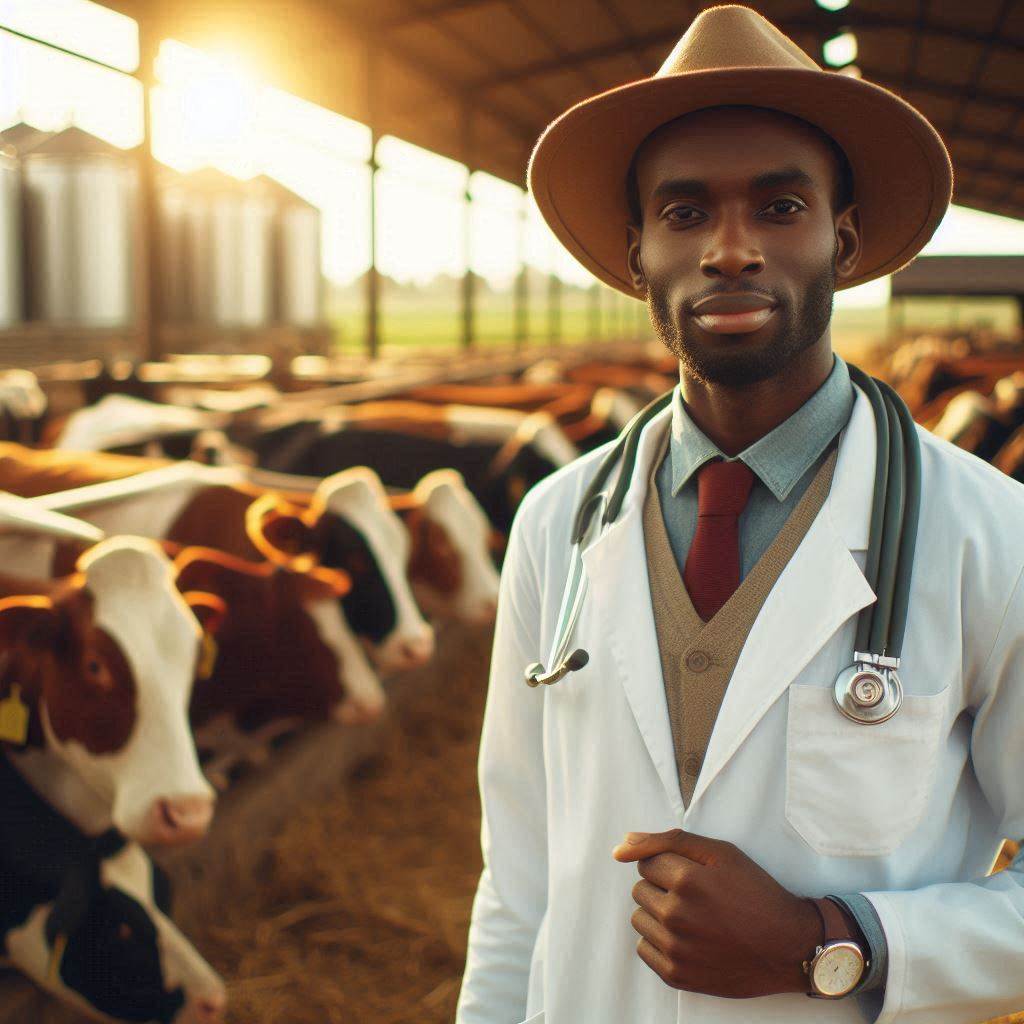Introduction
Livestock waste recycling involves converting animal waste into useful products like fertilizer, biogas, and compost.
Proper waste management in livestock farming is crucial for environmental sustainability and public health.
Effective recycling practices reduce pollution, minimize health risks, and improve soil fertility.
By recycling waste, farmers can create valuable resources and reduce their environmental footprint.
Improper waste disposal can lead to severe consequences, such as water contamination, greenhouse gas emissions, and the spread of diseases.
These challenges highlight the necessity for efficient waste management strategies in the livestock industry.
Addressing these issues protects ecosystems, enhances agricultural productivity, and promotes sustainable farming practices.
Understanding the environmental impact of livestock waste encourages the adoption of more sustainable and responsible practices.
As we delve into the best practices for livestock waste recycling, we aim to promote a cleaner, healthier environment.
Join us in discovering how innovative recycling methods can transform livestock farming.
Embrace these solutions to create a sustainable future for agriculture and the planet.
Together, we can make a significant impact on environmental preservation and agricultural efficiency.
Benefits of Livestock Waste Recycling
When it comes to managing livestock waste, recycling has numerous benefits that contribute to both environmental sustainability and agricultural efficiency:
Reduction of environmental pollution
By recycling livestock waste, the amount of harmful pollutants released into the environment can be significantly reduced. This helps in preserving soil and water quality, as well as protecting the ecosystem from contamination.
Production of organic fertilizers
One of the key benefits of livestock waste recycling is the production of high-quality organic fertilizers. These fertilizers are rich in nutrients essential for plant growth, and they can help improve soil health and productivity.
Cost-effective waste management solution for farmers
Instead of having to dispose of livestock waste through conventional means, recycling offers a cost-effective solution for farmers. By turning waste into valuable resources, farmers can save money on fertilizers and reduce their overall waste management expenses.
Contribution to sustainable agriculture and circular economy
By incorporating livestock waste recycling practices, farmers can contribute to sustainable agriculture and a circular economy. This means that resources are used efficiently, waste is minimized, and the overall environmental impact of farming is reduced.
Overall, livestock waste recycling not only helps in managing waste effectively but also provides valuable resources for sustainable agriculture while promoting environmental stewardship and economic benefits for farmers.
Read: Scholarship and Funding Opportunities for Forestry Students in Nigeria
Best Practices for Livestock Waste Recycling
Composting Techniques for Manure Management
- Turn manure into valuable compost.
- Mix manure with carbon-rich materials.
- Regularly aerate compost piles for decomposition.
- Monitor temperature and moisture levels.
- Utilize composted manure as organic fertilizer.
Utilizing Anaerobic Digestion for Biogas Production
- Capture methane from livestock waste.
- Construct anaerobic digesters on farms.
- Feed waste into the digester.
- Allow bacteria to break down waste.
- Collect and utilize biogas for energy.
Incorporating Vermiculture for Efficient Waste Processing
- Introduce earthworms into waste management.
- Worms consume organic matter.
- Create vermicompost with nutrient-rich worm castings.
- Vermicompost enhances soil fertility.
- Utilize vermicompost in agricultural operations.
Integrating Waste-to-Energy Technologies for Renewable Energy Generation
- Convert waste into energy sources.
- Install waste-to-energy systems.
- Utilize technologies like gasification or pyrolysis.
- Generate electricity or heat from waste.
- Reduce reliance on fossil fuels.
- Livestock waste recycling is crucial.
- Implementing composting, anaerobic digestion, vermiculture, and waste-to-energy technologies.
- These practices promote sustainability.
- They mitigate environmental impact.
- And they offer economic benefits to farmers.
Take Action
- Assess your farm’s waste management.
- Identify opportunities for improvement.
- Implement one or more recycling practices.
- Monitor and adjust processes as needed.
- Share your success with others.
By adopting these best practices, you contribute to a greener future.
Let’s work together for sustainable agriculture!
Read: Field Work & Practical Training in Nigerian Forestry Schools
Case Studies of Successful Livestock Waste Recycling Programs
Highlighting examples of farms or organizations that have effectively implemented waste recycling practices can provide valuable insight into successful strategies for sustainable waste management.
Harmony Farms
- Implemented a comprehensive composting system for livestock waste.
- Utilized the compost as fertilizer for crops, reducing the need for chemical fertilizers.
- Reduced greenhouse gas emissions and improved soil health.
- Increased crop yields and saved on fertilizer costs, leading to economic benefits.
EcoEnergy Solutions Organization
- Established a biogas plant to convert livestock waste into renewable energy.
- Generated electricity for on-farm use and for sale back to the grid.
- Reduced methane emissions from waste storage and provided a sustainable energy source.
- Received government grants for renewable energy production, further enhancing economic benefits.
These case studies demonstrate the effectiveness of different approaches to livestock waste recycling and the diverse benefits that can be achieved through sustainable waste management practices.
Read: Nigeria’s Forest Reserves: A Vital Part of Forestry Education

Regulations and Policies on Livestock Waste Recycling
Overview of Government Policies
Government policies play a crucial role in regulating waste management practices in the livestock industry. These policies are designed to protect the environment, public health, and ensure sustainable agricultural practices.
Importance of Compliance
It is essential for farmers to comply with environmental standards and guidelines set forth by regulatory bodies. Non-compliance can result in fines, penalties, and reputational damage to the farm.
Resources for Implementing Proper Practices
Various resources and support are available for farmers to implement proper waste recycling practices. These include financial incentives, technical assistance, and educational programs.
Guidelines for Livestock Waste Recycling
Regulations and policies aim to manage livestock waste effectively to minimize its impact on the environment and human health. It is essential for farmers to understand and adhere to these regulations to ensure sustainable agricultural practices.
Segregation of Waste
Farmers should separate different types of waste generated on the farm, such as manure, urine, and bedding materials. This segregation helps in identifying suitable recycling methods for each type of waste.
Proper Storage and Handling
Livestock waste should be stored and handled in a manner that prevents contamination of water sources and soil. Proper storage facilities, such as manure pits or composting areas, should be constructed to contain waste safely.
Composting Techniques
Composting is a popular method for recycling livestock waste. Farmers can compost manure and bedding materials to produce nutrient-rich organic fertilizers for their crops. Proper composting techniques should be followed to ensure the quality of the end product.
Nutrient Management Plans
Farmers should develop nutrient management plans that outline the proper application of manure and other organic fertilizers on their fields. These plans help in optimizing nutrient utilization, reducing nutrient runoff, and minimizing environmental impact.
Regulation Compliance
Farmers must comply with regulations related to waste management, such as obtaining permits for waste disposal and following guidelines for land application of manure. Failure to comply can lead to legal consequences and environmental harm.
Support and Assistance for Farmers
Government agencies, agricultural associations, and environmental organizations provide support and assistance to farmers in implementing proper waste recycling practices.
Farmers can access financial incentives, technical guidance, and training programs to help them comply with regulations and improve their waste management systems.
Overall, regulations and policies on livestock waste recycling are essential for promoting sustainable agricultural practices, protecting the environment, and ensuring the health and well-being of communities.
Farmers play a crucial role in implementing proper waste management practices and should take advantage of available resources and support to comply with regulations and achieve sustainability in their operations.
Read: Comparing Forestry Curriculum: Nigeria vs. Global Standards
Conclusion
In closing, best practices for livestock waste recycling ensure a sustainable and efficient farming process, benefiting both the environment and agriculture.
Throughout this blog post, we have discussed various methods such as composting, anaerobic digestion, and nutrient recovery.
These techniques not only reduce waste but also produce valuable by-products like fertilizer and biogas, contributing to a circular economy.
Sustainable waste management in livestock farming is crucial for maintaining environmental health and conserving resources.
Proper waste recycling reduces pollution, enhances soil fertility, and promotes renewable energy sources.
By converting waste into useful products, farmers can improve their productivity while minimizing their environmental footprint.
We strongly urge farmers, stakeholders, and policymakers to prioritize waste recycling initiatives in the livestock industry.
By adopting these best practices, the livestock sector can significantly reduce its impact on the environment and contribute to a healthier planet.
Implementing effective waste recycling strategies is essential for achieving long-term sustainability and resilience in agriculture.
Let’s commit to sustainable waste management and drive positive change in livestock farming.




